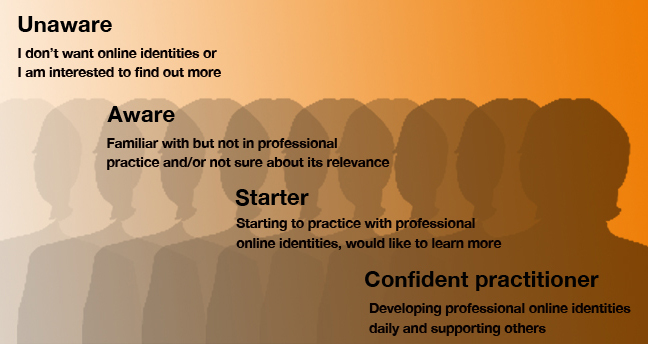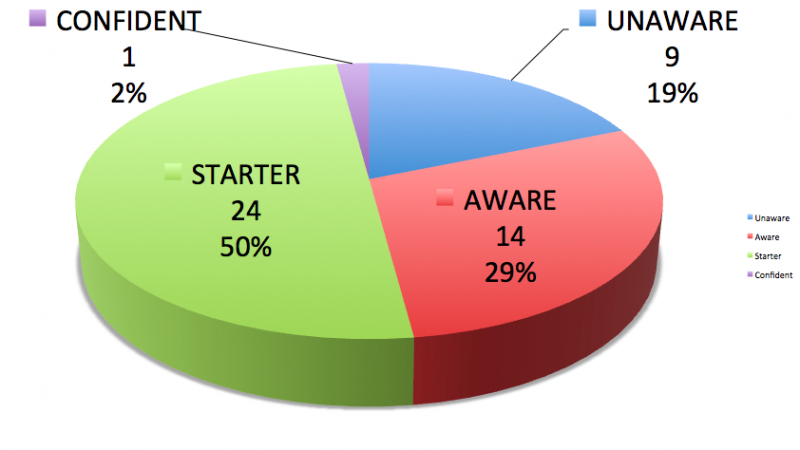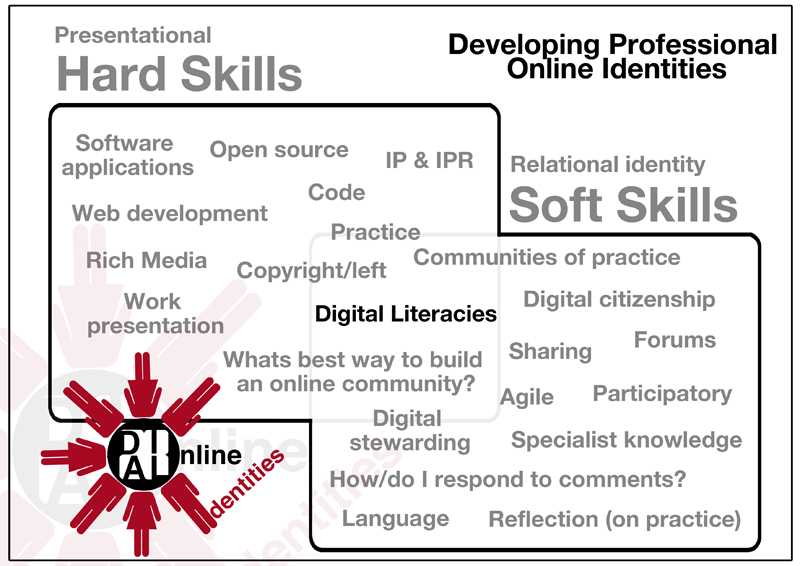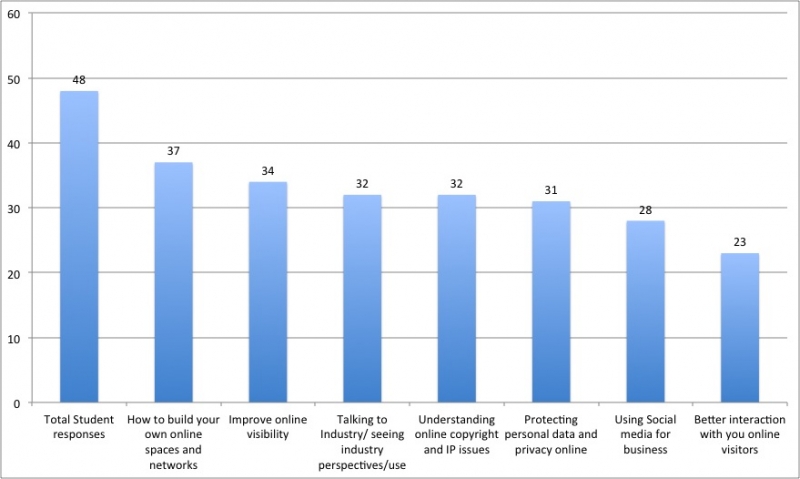Audio recording of Developing Professional Online Identities project introduction
Embed:
The DIAL project met today with staff and students of the Performance Design and Practice course/subject area at Central Saint Martins. I met with around 65, 1st, 2nd and 3rd year students and course staff and had 15 to 20 minutes to introduce the new Developing Professional Online Identities project which we hope to pilot with this cohort.
Project Aim: The project will identify and develop specific digital literacies/hard and soft skills (Presentation/Relational skills see image) in maintaining professional online identities with the aim of enhancing student/graduate employability and industry readiness. The project will focus on developing independence and confidence in web development, online professional practice, open source use, participatory/online communities and digital citizenship.
The first question asked by the course director to the students was; ‘is this a useful, worth while project, are you interested’? There was a clear and positive agreement this was very welcome.
Identity/practice communication and your online identities

The Professional Online Identities project is essentially about communication, how we communicate and consume data, data that communicates who we are and what we do. It was important to introduce this project physically face to face with the students and staff at CSM, the physical element of this project has to be remembered and acknowledged as important as the digital/virtual, understanding this balance in online communication is fundamental to its success we will be using Lego serious play early in this project.
 I started the presentation by asking if anyone objected to me taking a photo f the group to be posted online, I gave people the opportunity to look away or let me know if they did not want to be in photo if they wanted (no one objected). This helped kick off this session as the simple act of taking a group photo, in this context highlights a few questions about the rules of the web, what are the rules or the digital etiquette of the web and who makes these rules and which do we follow? I obtained permission but should I have requested they sign a more formal release form? This would take time and maybe be too formal. My photography skills are not the greatest as you can see and this also brings up the question of quality, do we trust others to represent us? We had an interesting discussion at DIALs recent Improving Your Prospects through Online Profiles panel discussion where the question of course identity was raised as a concern for some of UALs course leaders/directors in terms of students adding their work to Showtime http://showtime.arts.ac.uk/ , the University's free online platform where graduates can present their work and creative practice. Some course directors were concerned about having the ‘right’ students work being associated with their course, e.g. they didn't want the poorer work to be directly/publicly associated to their course in this ‘open’ way.
I started the presentation by asking if anyone objected to me taking a photo f the group to be posted online, I gave people the opportunity to look away or let me know if they did not want to be in photo if they wanted (no one objected). This helped kick off this session as the simple act of taking a group photo, in this context highlights a few questions about the rules of the web, what are the rules or the digital etiquette of the web and who makes these rules and which do we follow? I obtained permission but should I have requested they sign a more formal release form? This would take time and maybe be too formal. My photography skills are not the greatest as you can see and this also brings up the question of quality, do we trust others to represent us? We had an interesting discussion at DIALs recent Improving Your Prospects through Online Profiles panel discussion where the question of course identity was raised as a concern for some of UALs course leaders/directors in terms of students adding their work to Showtime http://showtime.arts.ac.uk/ , the University's free online platform where graduates can present their work and creative practice. Some course directors were concerned about having the ‘right’ students work being associated with their course, e.g. they didn't want the poorer work to be directly/publicly associated to their course in this ‘open’ way.
Then how do we manage our Professional Online Identities (POI), especially if others are adding and contributing to our POI. This is particularly the case in the creative industries sector where POIs are important to practice, your practice may be discussed, commented on by anyone and/or media or industry may write about you and your work. If you are actively updating and communicating your practice online does this make it easier to communicate or not?
Is there a balance we need to explore between how we engage, add and contribute to/with our POI:
- Do we do nothing about your POI (be as anonymous as possible, don't engage), there are three aspects to this to consider (less control over your POI and digital footprint)
1. I don't want to be online in anyway. I want to be anonymous!
2. I don't have the skills to engage or create a POI
3. I’m too busy to be online, happy to let others write about or represent me or create my POI e.g. (the public, agents, collectors, employers, fans, media, galleries etc.)
- And/or actively engage and create our POI, fully engage. (More control over your POI and digital footprint)
We don't have the answers to these questions and this project aims to explore these issues and more. We hope to ask many questions and work them out together over the next few months.
Students were asked if interested in this project to express an interest by filling out this form, they were asked to, ‘Identify which one of the 4 self-selecting groups you feel you relate to you’ 90% of the group responded instantly with an expression of interest:
 |
 |
Unaware - not familiar with professional online identities. I am interested to find out more or I don’t want online identities
Aware – familiar with professional online identities but not in professional practice and/or not sure about its relevance
Starter – Starting to practice with professional online identities, still lots to learn, would like to learn more
Confident practitioner – developing professional online identities daily and supporting others
Which hard and soft skills do we need?
Students were also asked in the survey which direction this project should take, ‘where should this project be focusing in terms of developing support, advice, research and training?
To date DIAL have identified the following areas and these were given as suggestions, students expressed an interest in all the following areas:
|
 |
|
Additional suggestions included;
|
|

After the session as I was leaving I saw this piece of work in the CSM foyer, must be a sign! Central Banner by Eva Yarza Hilario.

programme team and 90 + students meeting at CSM on 7 Jan Monday morning from 10;30am to introduce the following project ( http://process.arts.ac.uk/content/developing-professional-online-identities-project-details).
The ‘Developing Professional Online Identities’ project at CSM Centre for Performance
Project Dates - January to July 2013
Objectives: The project team will explore the challenges, limitations and benefits (students and staff) in developing 'public' web identities/profiles e.g creating and maintaining 'public' online profiles for educational and professional practice. The project team will research and evaluate sector needs for developing resources, support, training and skills in creating, developing and maintaining professional online identities
Who are we?
DIAL - Support, evaluation & research in digital literacies, development of communities of practice and resource/training development.
Learn-IT - Working with DIAL Develop face- face and flexible (online) training resources, will provide bespoke training for staff and students,
SEE – Student Enterprise and employability integration with employers, online content support (design, cluster, reference and package) including curriculum integration.
CLTAD - Specialist technical Support, advice and consultancy/curriculum integration.
CC Skills - Consultant - creative & cultural skills Skills and training for the UK's creative and cultural industries.
Q-Art London - Consultant, collaboration and outreach
Are you interested in taking part in this project? If so please fill out this form (PAPER HANDOUTS please return to Chris Follows c.follows@arts.ac.uk?).
OPEN FORM ON NEW PAGE HERE
IF YOU HAVE COMPLETED THE FORM ABOVE, PLEASE MAKE SURE YOU HAVE CLICKED THE 'SUBMIT' TAB ABOVE BEFORE LEAVING THIS PAGE
The student representatives will support the project team with the integration, development of the project and its impact of digital literacy skills in the development of professional online identities on:
- Course profile, design, objectives, processes and assessment.
- Institutional objectives
- Student competencies and practice
- Staff competencies and practice
- Industry perceptions and needs
- Student needs and expectations
- Student employability
What next?
Once we have identified interested participants we will carry out some initial workshops to form the project in line with your individual and course needs, then for specific groups we will:
Training development and workshops:
Practical training, webmaking skills, tips and tools e.g. devises, platforms, web development, open source, social media etc.
Presenting self and professional practice online, enhancing your employability etc; Create a community of practice and framework for peer to peer and/or mentor support.
Professional/industry speakers on professional identities, role within creative industries, recruitment, industry etc
The project team will support the development and use of online tools, processes and skills as the project develops and respond to real needs. We aim to explore and develop the (technical and relational) aspects for developing professional online Identities.
At the end of the project we aim to develop and design a pilot MOOC with specific pathways for bespoke training in this field. DIAL/process.arts/SEE and Learn IT (collaboration).

This Work, Audio recording of Developing Professional Online Identities project introduction, by cfollows is licensed under a Creative Commons Attribution 4.0 International license.


